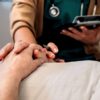Hopes for remdesivir were buoyed on April 29 with the results of two studies, one from a National Institutes of Health study and the other from a Gilead-sponsored one.
The first trial, sponsored by the NIH’s National Institute of Allergy and Infectious Diseases (NIAID), led by Anthony Fauci, MD, is particularly important since it was the first study released that was placebo controlled (studying similar groups one that gets the drug and one that gets a placebo is the only way to clearly show a benefit over doing nothing).
A preliminary data analysis of 1063 patients showed that recovery for those who received remdesivir was 31% faster compared with those in the placebo group. The medium time to recovery was 11 days for patients in the remdesivir group compared with 15 days for those on placebo. The mortality rate in the remdesivir group was 8%; in the placebo group, the figure was 11.6%. This was not considered statistically significant, according to Fauci. Information on side effects was not disclosed. However disclosed side effects from a different trial on remdesivir reported the same day included acute respiratory failure and elevated liver enzymes (see below, this article).
Fauci expressed high optimism about the results, saying in the Oval Office to reporters that the trial was “highly powered” and results “have proven that a drug can block the virus,” though the extent of that blocking and its effectiveness in all patients remains unclear. In addition, reiterating information from a data safety monitoring board that looked at the results, he said that “the data shows that remdesivir has a clear-cut, significant, positive effect in diminishing the time to recovery.”
As the study, called ACTT, is still ongoing, Fauci noted that all patients in the trial will now receive remdesivir given the data to date. He added the results still need to be peer-reviewed before being published in a journal and before being considered final.
Topline results for the second study called SIMPLE, were flawed because it did not have a comparison group that received a placebo or other drug. Without that type of comparison it’s impossible to know if a different drug would have performed better, or even if a placebo would have had the same result.
The study, paid for by the company that owns the drug, found that there was no major difference in efficacy between patients with COVID-19 being given a 5-day regimen of remdesivir compared with a 10-day one. This trial, which enrolled about 400 people, found that the time it took for 50% of patients to improve was 10 days in the 5-day treatment group and 11 days in the 10-day one.
The most common side effects observed in either group in 10% or more of either group were nausea, nausea (5-day: 10% vs. 10-day: 8.6%); acute respiratory failure (5-day: 6% vs. 10-day: 10.7%, n= 21/197); and elevated liver enzymes (7.3% of all patients), Like the other study, the results have yet to be peer reviewed.
An analysis found that early treatment with remdesivir, when symptoms are first observed, may lead to better outcomes. At day 14, 62% of patients treated early were released from the hospital compared with 49% of patients whose treatment began later on.
Results from a second SIMPLE trial, using the same parameters but in patients with more moderate COVID-19, are expected at the end of next month.
See MedShadow’s Should You Join A COVID-19 Clinical Trial for more information on what clinical trials are and how important they are for determining safety and efficacy of proposed new drugs.
On May 1, the FDA granted emergency use authorization for remdesivir for use in patients with COVID-19. The move follows the release of data two days earlier from a trial that showed the drug improved time to recovery compared with those on a placebo. The same day, NIAID chief Dr. Anthony Fauci said that based on the results, remdesivir would become the “standard of care” for COVID-19.






